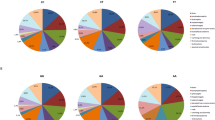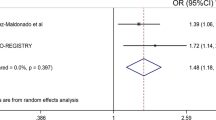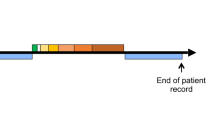Abstract
We analyzed clinical and genetic factors contributing to infections in 457 subjects with early rheumatoid arthritis (RA) enrolled in a prospective, 1-year clinical trial of methotrexate and the TNF inhibitor etanercept. Subjects were genotyped for the following single nucleotide polymorphisms (SNPs): (TNF −308, −238, and +488); lymphotoxin-α (LTA) (LTA +249, +365, and +720); and Fc gamma receptors FCGR2A 131 H/R; FCGR3A 176 F/V; and FCGR3B NA 1/2 and genotypes were correlated with infections. At least one URI was noted in 52% of subjects (99/191) with the NA2/NA2 genotype of the neutrophil-specific FCGR3B gene, compared to 42% (77/181) of those with the NA1/NA2 genotype and 39% (23/59) of those with the NA1/NA1 genotype (P=0.038). Urinary tract infection (UTI) was associated with the TNF −238 A (odds ratio(OR) 2.56, 95% confidence interval (CI) 1.05–6.25) and LTA +365 C (OR 1.73, 95% CI 1.07–2.79) alleles, and marginally with the FCGR3A F allele (OR 1.72, 95% CI 0.99–3.00). There was a striking linear correlation between UTI and the number of risk alleles defined by these three SNPs (P<0.001), suggesting an additive effect on susceptibility. These findings have important implications for the role of genetics in susceptibility to bacterial and viral infections.
This is a preview of subscription content, access via your institution
Access options
Subscribe to this journal
Receive 6 digital issues and online access to articles
$119.00 per year
only $19.83 per issue
Buy this article
- Purchase on Springer Link
- Instant access to full article PDF
Prices may be subject to local taxes which are calculated during checkout

Similar content being viewed by others
References
Doran MF, Crowson CS, Pond GR, O'Fallon WM, Gabriel SE . Predictors of infection in rheumatoid arthritis. Arthritis Rheum 2002; 46: 2294–2300.
Kremer JM . Rational use of new and existing disease-modifying agents in rheumatoid arthritis. Ann Intern Med 2001; 134: 695–706.
van der Veen MJ, van der Heide A, Kruize AA, Bijlsma JW . Infection rate and use of antibiotics in patients with rheumatoid arthritis treated with methotrexate. Ann Rheum Dis 1994; 53: 224–228.
Bathon JM, Martin RW, Fleischmann RM et al. A comparison of etanercept and methotrexate in patients with early rheumatoid arthritis. N Engl J Med 2000; 343: 1586–1593.
Cunnane G, Doran M, Bresnihan B . Infections and biological therapy in rheumatoid arthritis. Best Pract Res Clin Rheumatol 2003; 17: 345–363.
Netea MG, Radstake T, Joosten LA, van der Meer JW, Barrera P, Kullberg BJ . Salmonella septicemia in rheumatoid arthritis patients receiving anti-tumor necrosis factor therapy: association with decreased interferon-gamma production and Toll-like receptor 4 expression. Arthritis Rheum 2003; 48: 1853–1857.
Engwerda CR, Mynott TL, Sawhney S, De Souza JB, Bickle QD, Kaye PM . Locally up-regulated lymphotoxin alpha, not systemic tumor necrosis factor alpha, is the principle mediator of murine cerebral malaria. J Exp Med 2002; 195: 1371–1377.
Roach DR, Briscoe H, Saunders B, France MP, Riminton S, Britton WJ . Secreted lymphotoxin-alpha is essential for the control of an intracellular bacterial infection. J Exp Med 2001; 193: 239–246.
Schluter D, Kwok LY, Lutjen S et al. Both lymphotoxin-alpha and TNF are crucial for control of Toxoplasma gondii in the central nervous system. J Immunol 2003; 170: 6172–6182.
McGuire W, Hill AV, Allsopp CE, Greenwood BM, Kwiatkowski D . Variation in the TNF-alpha promoter region associated with susceptibility to cerebral malaria. Nature 1994; 371: 508–510.
Brinkman BM, Huizinga TW, Kurban SS et al. Tumour necrosis factor alpha gene polymorphisms in rheumatoid arthritis: association with susceptibility to, or severity of, disease? Br J Rheumatol 1997; 36: 516–521.
Cabrera M, Shaw MA, Sharples C, Williams H, Castes M, Convit J et al. Polymorphism in tumor necrosis factor genes associated with mucocutaneous leishmaniasis. J Exp Med 1995; 182: 1259–1264.
Hohler T, Schaper T, Schneider PM, Meyer zum Buschenfelde KH, Marker-Hermann E . Association of different tumor necrosis factor alpha promoter allele frequencies with ankylosing spondylitis in HLA-B27 positive individuals. Arthritis Rheum 1998; 41: 1489–1492.
Hohler T, Kruger A, Gerken G, Schneider PM, Meyer zBK, Rittner C . Tumor necrosis factor alpha promoter polymorphism at position -238 is associated with chronic active hepatitis C infection. J Med Virol 1998; 54: 173–177.
Wilson AG, Gordon C, di Giovine FS et al. A genetic association between systemic lupus erythematosus and tumor necrosis factor alpha. Eur J Immunol 1994; 24: 191–195.
Kimberly RP, Salmon JE, Edberg JC . Receptors for immunoglobulin G. Molecular diversity and implications for disease. Arthritis Rheum 1995; 38: 306–314.
Takai T . Roles of Fc receptors in autoimmunity. Nat Rev Immunol 2002; 2: 580–592.
Kimberly RP, Wu J, Gibson AW et al. Diversity and duplicity: human Fcgamma receptors in host defense and autoimmunity. Immunol Res 2002; 26: 177–189.
Kimberly RP, Moreland LW, Wu J, Edberg JC, Weinblatt ME, Blosch C . Occurrence of infection varies with Fc receptor genotype. Arthritis Rheum 1998; 41 (Suppl): S273 (Abstract).
Kimberly RP, Moreland LW, Gibson A, Weinblatt M, Bosch C . Susceptibility to infection may vary with TNF promoter genotype. Arthritis Rheum 1998; 41 (Suppl): S273 (Abstract).
Fijen CA, Bredius RG, Kuijper EJ et al. The role of Fcgamma receptor polymorphisms and C3 in the immune defence against Neisseria meningitidis in complement-deficient individuals. Clin Exp Immunol 2000; 120: 338–345.
Rekand T, Langeland N, Aarli JA, Vedeler CA . Fcgamma receptor IIIA polymorphism as a risk factor for acute poliomyelitis. J Infect Dis 2002; 186: 1840–1843.
Domingo P, Muniz-Diaz E, Baraldes MA et al. Associations between Fc gamma receptor IIA polymorphisms and the risk and prognosis of meningococcal disease. Am J Med 2002; 112: 19–25.
Meisel P, Carlsson LE, Sawaf H, Fanghaenel J, Greinacher A, Kocher T . Polymorphisms of Fc gamma-receptors RIIa, RIIIa, and RIIIb in patients with adult periodontal diseases. Genes Immun 2001; 2: 258–262.
Sanders LA, van de Winkel JG, Rijkers GT et al. Fc gamma receptor IIa (CD32) heterogeneity in patients with recurrent bacterial respiratory tract infections. J Infect Dis 1994; 170: 854–861.
Yee AM, Phan HM, Zuniga R, Salmon JE, Musher DM . Association between FcgammaRIIa-R131 allotype and bacteremic pneumococcal pneumonia. Clin Infect Dis 2000; 30: 25–28.
Yee AM, Ng SC, Sobel RE, Salmon JE . Fc gammaRIIA polymorphism as a risk factor for invasive pneumococcal infections in systemic lupus erythematosus. Arthritis Rheum 1997; 40: 1180–1182.
Wilson AG, Symons JA, McDowell TL, McDevitt HO, Duff GW . Effects of a polymorphism in the human tumor necrosis factor alpha promoter on transcriptional activation. Proc Natl Acad Sci, USA 1997; 94: 3195–3199.
Stüber F, Udalovaa IA, Book M et al. 308 tumor necrosis factor (TNF) polymorphism is not associated with survival in severe sepsis and is unrelated to lipopolysaccharide inducibility of the human TNF promoter. J Inflamm 1995; 46: 42–50.
Knight JC, Keating BJ, Rockett KA, Kwiatkowski DP . In vivo characterization of regulatory polymorphisms by allele-specific quantification of RNA polymerase loading. Nat Genet 2003; 33: 469–475.
Kaijzel EL, van Krugten MV et al. Functional analysis of a human tumor necrosis factor alpha (TNF-alpha) promoter polymorphism related to joint damage in rheumatoid arthritis. Mol Med 1998; 4: 724–733.
Mullighan CG, Fanning GC, Chapel HM, Welsh KI . TNF and lymphotoxin-alpha polymorphisms associated with common variable immunodeficiency: role in the pathogenesis of granulomatous disease. J Immunol 1997; 159: 6236–6241.
Edberg JC, Langefeld CD, Wu J et al. Genetic linkage and association of Fcgamma receptor IIIA (CD16A) on chromosome 1q23 with human systemic lupus erythematosus. Arthritis Rheum 2002; 46: 2132–2140.
Stephens M, Smith NJ, Donnelly P . A new statistical method for haplotype reconstruction from population data. Am J Hum Genet 2001; 68: 978–989.
SPSS for Windows. Rc1.11.01.2001, Chicago: SPSS Inc.
Acknowledgements
This work was supported by NIH R01 AR47224, P60 AR48095, the UAB Multidisciplinary Clinical Research Center Methodology Core; K24 AR-02175 and the Rosalind Russell Medical Research Center for Arthritis at UCSF. The technical assistance of Kevin N Turner, Blanche Woehl, Yuanqing Zhu, and Jinyi Wang is gratefully acknowledged.
Author information
Authors and Affiliations
Corresponding author
Rights and permissions
About this article
Cite this article
Hughes, L., Criswell, L., Beasley, T. et al. Genetic risk factors for infection in patients with early rheumatoid arthritis. Genes Immun 5, 641–647 (2004). https://doi.org/10.1038/sj.gene.6364137
Received:
Accepted:
Published:
Issue Date:
DOI: https://doi.org/10.1038/sj.gene.6364137
Keywords
This article is cited by
-
Molecular determinants of disease severity in urinary tract infection
Nature Reviews Urology (2021)
-
The innate immune response during urinary tract infection and pyelonephritis
Pediatric Nephrology (2014)
-
Low copy number of the FCGR3B gene and rheumatoid arthritis: a case-control study and meta-analysis
Arthritis Research & Therapy (2012)
-
Susceptibility to acute pyelonephritis or asymptomatic bacteriuria: Host–pathogen interaction in urinary tract infections
Pediatric Nephrology (2012)
-
Genetics of innate immunity and UTI susceptibility
Nature Reviews Urology (2011)



